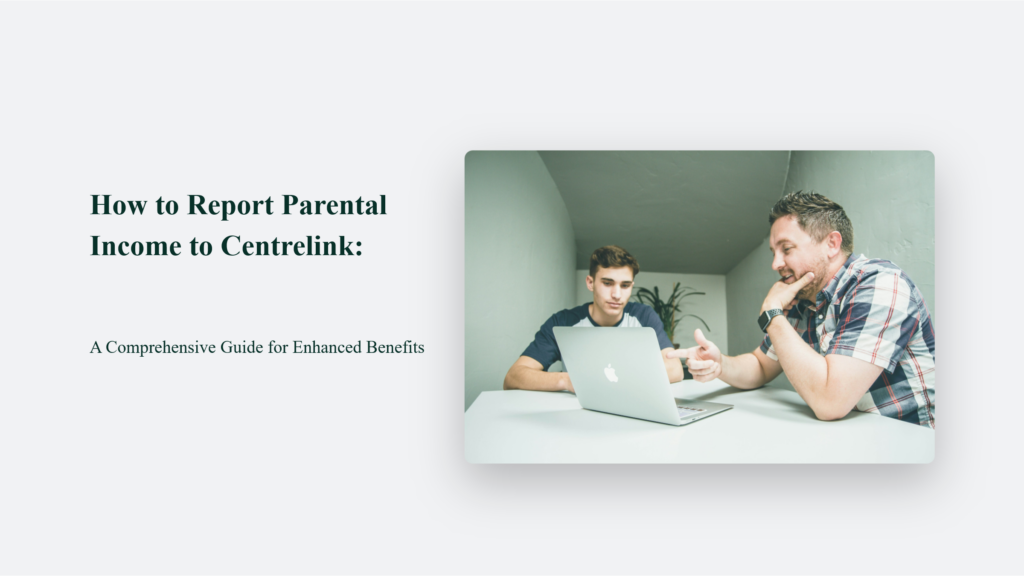Navigating the complexities of government assistance can be daunting for many families. One key aspect that often confuses is the requirement to advise parental income to Centrelink.
This information is critical in determining the amount of financial aid a family receives. This article will explore why accurate reporting is necessary and beneficial and how to ensure compliance with Centrelink’s policies.

Understanding the Importance of Reporting Parental Income to Centrelink
When families apply for government benefits in Australia, reporting parental income to Centrelink is crucial. This process involves submitting detailed and accurate income information for parents or guardians to Centrelink, the agency responsible for social security payments. Such reporting is essential, especially for families with dependent children receiving benefits like Youth Allowance or other forms of family assistance.
What is Parental Income Reporting?
Parental income reporting to Centrelink refers to the official process by which families report the earnings of parents or guardians. This is required primarily to assess eligibility and the benefits that dependent children can receive under various assistance programs. The key objective is to ensure that financial support is tailored accurately to the family’s financial status and needs.
Why Accurate Reporting Matters
Accurate and timely reporting of parental income is vital for several compelling reasons:
Fairness and Equity:
- Ensuring Proper Allocation of Resources: By reporting accurate income figures, families help Centrelink distribute assistance fairly based on actual financial needs. It prevents those who might not need assistance from receiving undue benefits, thereby allocating more resources to those in genuine need.
Compliance:
- Adhering to Legal Requirements: It is legally mandatory to report income accurately. This transparency helps maintain the integrity of the welfare system and ensures that all beneficiaries are treated equitably.
- Avoiding Financial Penalties: Incorrect reporting can lead to overpayments, which families might need to repay. This could include penalties in some cases, making accurate reporting a safeguard against potential legal and financial issues.
Optimized Assistance:
- Receiving Correct Benefit Amounts: Regular and accurate income updates ensure that families receive only what they are entitled to. This optimization helps in planning household budgets more effectively, especially under fluctuating income conditions.
The Role of Parental Income in Calculating Youth Allowance
Parental Income and Youth Allowance
Youth Allowance is a financial support payment provided by the Australian government to eligible young people aged 24 or under who are students, apprentices, job seekers, or those assessed as having a temporary incapacity for full-time study or work. The amount of Youth Allowance a recipient receives is heavily dependent on their parents’ or guardians’ income if they are considered a dependent youth.
Parental Income Test
Centrelink applies a parental income test to assess the level of Youth Allowance payment for dependent youths. The key points regarding this test are:
- It assesses the combined taxable income of the young person’s parents or guardians from the latest available tax year.
- Parental income includes taxable income, tax-free pensions/benefits, fringe benefits, foreign income, reportable super contributions, and net investment losses.
- For the 2023-24 financial year, a parental income below $56,137 per annum allows the maximum Youth Allowance rate.
- For every dollar of parental income over $56,137, the Youth Allowance payment is reduced by 20 cents.
- There are higher income cut-off thresholds if other dependent children are in the family.
Family Pool and Maximum Rate Calculation
The impact of parental income is calculated based on a ‘family pool’ concept:
- The maximum potential payments for all dependent youth and younger children are combined into a ‘family pool’.
- The parental income test result is calculated as a proportion of this pool based on the individual’s share.
- It prevents the parental income test from having a disproportionately large impact on any one child’s payment.
Other Factors
A few other factors can influence how parental income affects Youth Allowance:
- The young person’s income and assets are also assessed, and payments can be reduced further.
- If the parents are separated, usually only the income of the parent the youth lives with is considered.
- Certain scholarships are exempt from the personal income test up to set thresholds.
To get an accurate estimate of their Youth Allowance entitlements based on parental income and other factors, individuals can use Centrelink’s Payment and Service Finder tool or seek advice from the Financial Information Service.
The Bottom Line:
By understanding and adhering to the guidelines for advising parental income, families can ensure they receive the appropriate benefits, minimize the risk of accruing debts, and maintain their financial stability. Whether you are a new applicant or have been a part of the system for years, staying informed and proactive is key to managing your interactions with Centrelink effectively.
Frequently Asked Questions:
What happens if I don’t report a change in parental income?
Failure to report changes can result in overpayments, which might have to be paid back, along with possible penalties.
How often should I report parental income to Centrelink?
You should report any significant changes to parental income as soon as they occur, but generally, updates should be made every fortnight if incomes fluctuate regularly.
Can I report parental income online?
Yes, Centrelink offers online reporting through their website and mobile app, making it accessible and convenient to update income details as needed.




